- Home
- J. R. R. Tolkien
The Book of Lost Tales, Part One Page 10
The Book of Lost Tales, Part One Read online
Page 10
There said Lindo: ‘Is it to be tales, as of custom, again this night, or shall it be musics and the singing of songs?’ And the most said songs and music, and thereat skilled ones arose who sang old melodies or maybe roused dead minstrelsy of Valinor to life amid the flicker of that firelit room. Some too spake poesies concerning Kôr, and Eldamar, short snatches of the wealth of old; but soon the song and music died down and there was a quiet, while those there thought of the departed beauty and longed eagerly for the Rekindling of the Magic Sun.
Now at length spake Eriol to Lindo, saying: ‘One Rúmil the doorward, and, methought, a great sage, did this morning in the garden relate to me the beginning of the world and the coming of the Valar. Now fain would I hear of Valinor!’
Then said Rúmil, for he sat upon a stool in a deep-shadowed nook: ‘Then with the leave of Lindo and of Vairë I will begin the tale, else will you go on asking for ever; and may the company have pardon if they hear old tales again.’ But Vairë said that those words concerning the oldest things were far from stale yet in the ears of the Eldar.
Then said Rúmil:
‘Behold, Manwë Súlimo and Varda the Beautiful arose. Varda it was who at the playing of the Music had thought much of light that was of white and silver, and of stars. Those twain gathered now wings of power to themselves and fared swiftly through the three airs. Vaitya is that which is wrapped dark and sluggish about the world and without it, but Ilwë is blue and clear and flows among the stars, and last came they to Vilna that is grey and therein may the birds fly safely.
With them came many of those lesser Vali who loved them and had played nigh them and attuned their music to theirs, and these are the Mánir and the Súruli, the sylphs of the airs and of the winds.
Now swiftly as they fared Melko was there before them, having rushed headlong flaming through the airs in the impetuosity of his speed, and there was a tumult of the sea where he had dived and the mountains above him spouted flames and the earth gaped and rocked; but Manwë beholding this was wroth.
Thereafter came Ulmo and Aulë, and with Ulmo were none, save Salmar only who was after known as Noldorin, for good though the heart of that mighty one he thought ever deep thoughts alone, and was silent and aloof and haughty even to the Ainur; but with Aulë was that great lady Palúrien whose delights were richness and fruits of the earth, for which reason has she long been called Yavanna among the Eldar. About them fared a great host who are the sprites of trees and woods, of dale and forest and mountain-side, or those that sing amid the grass at morning and chant among the standing corn at eve. These are the Nermir and the Tavari, Nandini and Orossi, brownies, fays, pixies, leprawns, and what else are they not called, for their number is very great: yet must they not be confused with the Eldar, for they were born before the world and are older than its oldest, and are not of it, but laugh at it much, for had they not somewhat to do with its making, so that it is for the most part a play for them; but the Eldar are of the world and love it with a great and burning love, and are wistful in all their happiness for that reason.
Now behind those greatest chieftains came Falman-Ossë of the waves of the sea and Ónen his consort, and with them the troops of the Oarni and Falmaríni and the long-tressed Wingildi, and these are the spirits of the foam and the surf of ocean. Now Ossë was a vassal and subordinate to Ulmo, and was so for fear and reverence and not for love. Behind him there came Tulkas Poldórëa rejoicing in his strength, and those brethren the Fánturi, Fantur of Dreams who is Lórien Olofántur, and Fantur of Death who is Vefántur Mandos, and those twain also who are named Tári for they are ladies of great worship, queens of the Valar. The one was the spouse of Mandos, and is known to all as Fui Nienna by reason of her glooms, and she is fain of mourning and tears. Many other names has she that are spoken seldom and all are grievous, for she is Núri who sighs and Heskil who breedeth winter, and all must bow before her as Qalmë-Tári the mistress of death. But lo, the other was the spouse of Oromë the hunter who is named Aldaron king of forests, who shouts for joy upon mountain-tops and is nigh as lusty as that perpetual youth Tulkas. Oromë is the son of Aulë and Palúrien, and that Tári who is his wife is known to all as Vána the fair and loveth mirth and youth and beauty, and is happiest of all beings, for she is Tuilérë or as the Valar said Vána Tuivána who bringeth spring, and all sing her praises as Tári-Laisi mistress of life.
Yet even when all these had crossed the confines of the world and Vilna was in uproar with their passing, there came still hurrying late Makar and his fierce sister Meássë and it had been better had they not found the world but remained for ever with the Ainur beyond Vaitya and the stars, for both were spirits of quarrelsome mood, and with some other lesser ones who came now with them had been the first and chief to join in the discords of Melko and to aid in the spreading of his music.
Last of all came Ómar who is called Amillo, youngest of the great Valar, and he sang songs as he came.
Then when all these great spirits were gathered together within the confines of the world Manwë spake to them, saying: “Lo now! How may the Valar abide in this fair place or be happy and rejoice in its goodness, if Melko be suffered to destroy it, and make fire and turmoil, so that we have not where to sit in peace, nor may the earth blossom or the designs of Ilúvatar come to being?”
Then all the Valar were angered with Melko, and Makar alone spoke against Manwë but the rest chose certain of their number to seek out the wrongdoer, and these were Mandos and Tulkas, Mandos for that of his dread aspect was Melko more in fear than of aught else save it were the strength of Tulkas’ arm, and Tulkas was the other.
Now those two sought him out and constrained him to come before Manwë, and Tulkas whose heart misliked the crooked guile of Melko gave him a blow with his fist, and he abode that then but did not forget. Yet did he speak the Gods fair, and said how he did scant harm, revelling only a while in the newness of the world; nor, said he, would he ever seek to do aught against the lordship of Manwë or the dignity of those chiefs Aulë and Ulmo, nor indeed to the hurt of any beside. Rather was it his counsel that each of the Valar should now depart and dwell amid those things that he loved upon Earth, nor should any seek to extend his sway beyond its just boundaries. In this there was some covert reflection upon Manwë and Ulmo, but of the Gods some took his words in faith and would use his advice, but others distrusted; and in the midst of their debate Ulmo arose and went to the Outermost Seas that were set beyond the Outer Lands. He loved not high words nor concourse of folk, and in those deep waters moveless and empty he purposed to dwell, leaving the governance of the Great and lesser seas to Ossë and Ónen his vassals. Yet ever of his magic deep in his outermost sea-halls of Ulmonan he controlled the faint stirrings of the Shadowy Seas, and ruled the lakes and springs and rivers of the world.
Now this was the manner of the Earth in those days, nor has it since changed save by the labours of the Valar of old. Mightiest of regions are the Great Lands where Men do dwell and wander now, and the Lost Elves sing and dance upon the hills; but beyond their westernmost limits lie the Great Seas, and in that vast water of the West are many smaller lands and isles, ere the lonely seas are found whose waves whisper about the Magic Isles. Farther even than this, and few are the boats of mortal men that have dared so far, are set the Shadowy Seas whereon there float the Twilit Isles and the Tower of Pearl rises pale upon their most western cape; but as yet it was not built, and the Shadowy Seas stretched dark away till their uttermost shore in Eruman.
Now the Twilit Isles are reckoned the first of the Outer Lands, which are these and Eruman and Valinor. Eruman or Arvalin is to the southward, but the Shadowy Seas run even to the edges of Eldamar to the north; yet must ships sail farther to reach these silver strands, for beyond Eruman stand the Mountains of Valinor in a great ring curving westward, and the Shadowy Seas to north of Eruman bend a vast bay inward, so that waves beat even upon the feet of the great cliffs and the Mountains stand beside the sea. There is Taniquetil glorious
to behold, loftiest of all mountains, clad in purest snow, and he looks from the bay’s head southward across Eruman and northward across the Bay of Faëry; indeed all the Shadowy Seas, even the sails of ships upon the sunlit waters of the great ocean and the throngs about westward havens in the lands of Men could afterward be seen therefrom, albeit that distance is counted out in unimagined leagues. But as yet the Sun had not risen and the Mountains of Valinor had not been raised, and the vale of Valinor lay wide and cold. Beyond Valinor I have never seen or heard, save that of a surety there are the dark waters of the Outer Seas, that have no tides, and they are very cool and thin, that no boat can sail upon their bosom or fish swim within their depths, save the enchanted fish of Ulmo and his magic car.
Thither is he now gone, but the Gods hold council concerning the words of Melko. It was the rede of Aulë and of his wife Palúrien, for they were the most grieved by the mischief of Melko’s turmoils and trusted his promises not at all, that the Gods should not separate as he bid, lest he take it into his heart perchance to attack them singly or do hurt to their possessions. “Is he not,” said they, “more powerful than any one of us save Manwë only? Rather let us build a dwelling wherein we may abide in joy together, faring only at need to the care and survey of our goods and fiefs. There even such as be of other mind may dwell at times, and find rest and pleasance after labours in the world.” Now Aulë’s mind and fingers itched already to be making things, and he urged this matter the more for that; and to most of the Gods it seemed a good counsel, and they fared about the world seeking a place to dwell in. Those were the days of Gloaming (Lomendánar), for light there was, silver and golden, but it was not gathered together but flowed and quivered in uneven streams about the airs, or at times fell gently to the earth in glittering rain and ran like water on the ground; and at that time Varda in her playing had set but a few stars within the sky.
In this dimness the Gods stalked North and South and could see little; indeed in the deepest of these regions they found great cold and solitude and the rule of Melko already fortified in strength; but Melko and his servants were delving in the North, fashioning the grim halls of Utumna, for he had no thought to dwell amongst the others, howso he might feign peace and friendship for the time.
Now because of the darkness Aulë suaded Melko to build two towers to the North and South, for he purposed to set upon them mighty lamps one upon each. These did Aulë himself fashion of gold and silver, and the pillars were raised by Melko and were very tall, and shone like pale blue crystal; and when Aulë smote them with his hand they rang like metal. They sprang up through the lower air even to Ilwë and the stars, and Melko said they were of an imperishable substance of great strength that he had devised; and he lied, for he knew that they were of ice. That one of the North he named Ringil and of the South Helkar, and the lamps were made ready and set upon them, being filled with gathered light, silver to the North and golden to the South. This light had Manwë and Varda gathered lavishly from the sky, that the Gods might the better explore the regions of the world, and choose the fairest for their home.
Now in that flaming light did they fare East and West, and East was a waste of tumbled lands and West great seas of darkness, for indeed they were gathered now upon those Twilit Isles and stood there gazing westward, when lo! the lamps to North and South flickered and fell, and as they fell the waters rose about the isles. Now these things they did not then understand, but it so happened that the blaze of those lights had melted the treacherous ice of the pillars of Melko, Ringil and Helkar, and great floods of water had poured from them into the Shadowy Seas. So great was their thaw that whereas those seas were at first of no great size but clear and warm, now were they black and wide and vapours lay upon them and deep shades, for the great cold rivers that poured into them. Thus were the mighty lamps unseated from on high and the clangour of their fall shook the stars, and some of their light was spilled again into the air, but much flowed upon the earth and made fires and deserts for its great volume ere it gathered into lakes and pools.
Then was the time of first night and it was very long; but the Valar were sorely wroth at the treachery of Melko and were like to be whelmed in the shadowy seas that now arose and sucked about their feet, covering many of the islands in their waves.
Then Ossë, for Ulmo was not there, gathered to him the Oarni, and putting forth their might they dragged that island whereon stood the Valar westward from the waters till they came to Eruman, whose high shores held the angry flood—and that was the first tide.
Then said Manwë: “Now will we make a dwelling speedily and a bulwark against evil.” So they fared over Arvalin and saw a wide open space beyond, reaching for unknown leagues even to the Outer Seas. There, said Aulë, would be a place well suited to great building and to a fashioning of realms of delight; wherefore the Valar and all their folk first gathered the most mighty rocks and stones from Arvalin and reared therewith huge mountains between it and that plain which now they name Valinor, or the land of the Gods. Aulë indeed it was himself who laboured for seven ages at Manwë’s bidding in the piling of Taniquetil, and the world rumbled in the gloom and Melko heard the noises of their labour. By reason of their great masonry is Erumáni now very broad and bare and of a marvellous level, for they removed all the stone and rock that was there; but the Mountains of Valinor are rugged and of impregnable height. Seeing at length that these towered mightily between Valinor and the world the Gods drew breath; but Aulë and Tulkas fared abroad with many of their folk and brought back all they might of marbles and good stones, of iron and gold and silver and bronze and all manner of substances. These they heaped amid the plain, and straightway Aulë began to labour mightily.
At last he says: “It is ill working in this gloom, and ’twas an evil deed of Melko’s that brought to ruin those fair lamps.” But Varda answering said: “Still is there much light remaining both in the airs and that which floweth spilled upon the earth”, and she wished to gather new store and set a beacon on Taniquetil. But Manwë suffered not more radiance to be gleaned from heaven, for that the dark was already that of night, but at his asking Ulmo rose from his deeps and fared to the blazing lakes and the pools of brilliance. Therefrom he drew rivers of light into vast vessels, pouring back waters in their place, and with these he got him back to Valinor. There was all the light poured into two great cauldrons that Aulë fashioned in the gloom against his return, and those are called Kulullin and Silindrin.
Now in the midmost vale they digged two great pits, and those are leagues asunder yet nigh together beside the vastness of that plain. In the one did Ulmo set seven rocks of gold brought from the most silent deeps of the sea, and a fragment was cast thereafter of the lamp that had burned awhile upon Helkar in the South. Then was the pit covered with rich earths that Palúrien devised, and Vána came who loveth life and sunlight and at whose song the flowers arise and open, and the murmur of her maidens round her was like to the merry noise of folk that stir abroad for the first time on a bright morning. There sang she the song of spring upon the mound, and danced about it, and watered it with great streams of that golden light that Ulmo had brought from the spilled lakes—yet was Kulullin almost o’erflowing at the end.
But in the other pit they cast three huge pearls that Ossë found in the Great Sea, and a small star Varda cast after them, and they covered it with foams and white mists and thereafter sprinkled lightly earth upon it, but Lórien who loveth twilights and flittering shadows, and sweet scents borne upon evening winds, who is the lord of dreams and imaginings, sat nigh and whispered swift noiseless words, while his sprites played half-heard tunes beside him like music stealing out into the dark from distant dwellings; and the Gods poured upon that place rivers of the white radiance and silver light which Silindrin held even to the brim—and after their pouring was Silindrin yet well nigh full.
Then came Palúrien, even Kémi the Earth-lady, wife of Aulë, mother of the lord of forests, and she wove spells about those two places,
deep enchantments of life and growth and putting forth of leaf, blossoming and yielding of fruit—but she mingled no word of fading in her song. There having sung she brooded for a great while, and the Valar sat in a circle about, and the plain of Valinor was dark. Then after a time there came at last a bright gleam of gold amid the gloom, and a cry of joy and praise was sent up by the Valar and all their companies. Behold from that place that had been watered from Kulullin rose a slender shoot, and from its bark pale gold effulgence poured; yet did that plant grow apace so that in seven hours there was a tree of mighty stature, and all the Valar and their folk might sit beneath its branches. Of a great shapeliness and goodly growth was that stock, and nought was there to break its smooth rind, which glowed faintly with a yellow light, for a vast height above the earth. Then did fair boughs thrust overhead in all directions, and golden buds swelled from all the twigs and lesser branches, and from these burst leaves of a rich green whose edges shone. Already was the light that that tree gave wide and fair, but as the Valar gazed it put forth blossom in exceeding great profusion, so that all its boughs were hidden by long swaying clusters of gold flowers like a myriad hanging lamps of flame, and light spilled from the tips of these and splashed upon the ground with a sweet noise.
Then did the Gods praise Vána and Palúrien and rejoice in the light, saying to them: “Lo, this is a very fair tree indeed, and must have a name unto itself,” and Kémi said: “Let it be called Laurelin, for the brightness of its blossom and the music of its dew,” but Vána would call it Lindeloksë, and both names remain.

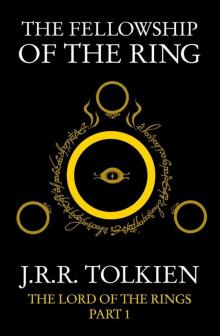 The Fellowship of the Ring
The Fellowship of the Ring The Hobbit
The Hobbit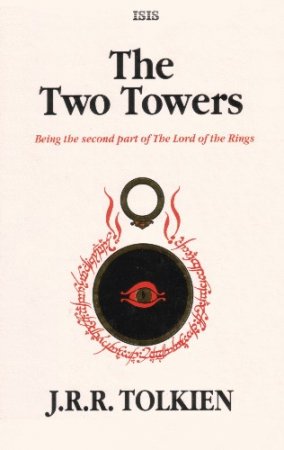 The Two Towers
The Two Towers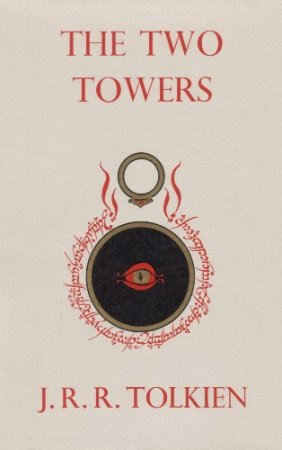 The Return of the King
The Return of the King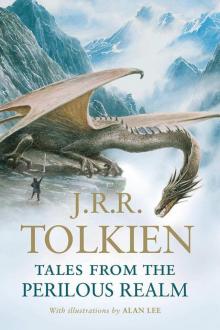 Tales From the Perilous Realm
Tales From the Perilous Realm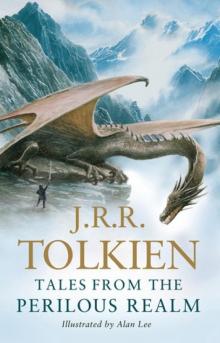 Leaf by Niggle
Leaf by Niggle The Silmarillon
The Silmarillon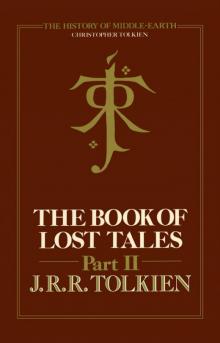 The Book of Lost Tales, Part Two
The Book of Lost Tales, Part Two The Book of Lost Tales, Part One
The Book of Lost Tales, Part One The Book of Lost Tales 2
The Book of Lost Tales 2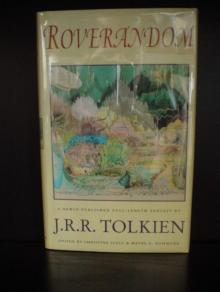 Roverandom
Roverandom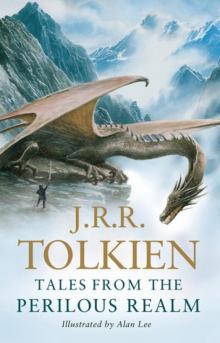 Smith of Wootton Major
Smith of Wootton Major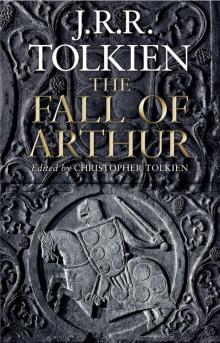 The Fall of Arthur
The Fall of Arthur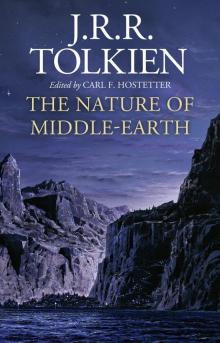 The Nature of Middle-earth
The Nature of Middle-earth The Lord of the Rings: The Fellowship of the Ring, The Two Towers, The Return of the King
The Lord of the Rings: The Fellowship of the Ring, The Two Towers, The Return of the King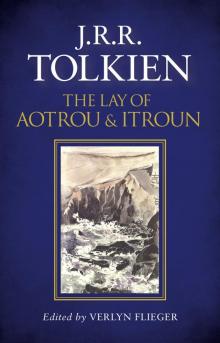 The Lay of Aotrou and Itroun
The Lay of Aotrou and Itroun lord_rings.qxd
lord_rings.qxd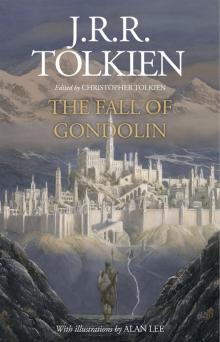 The Fall of Gondolin
The Fall of Gondolin The Book of Lost Tales, Part 1
The Book of Lost Tales, Part 1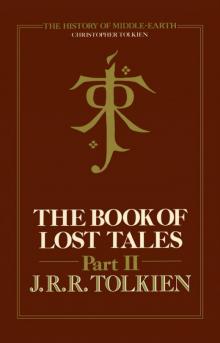 The Book of Lost Tales, Part 2
The Book of Lost Tales, Part 2 The Lord of the Rings
The Lord of the Rings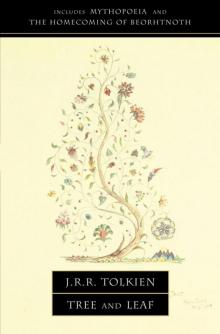 Tree and Leaf
Tree and Leaf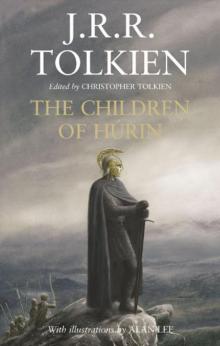 The Children of Húrin
The Children of Húrin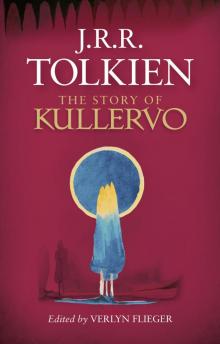 The Story of Kullervo
The Story of Kullervo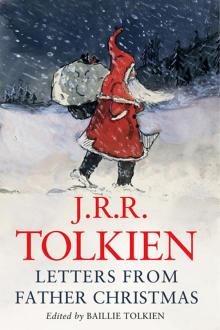 Letters From Father Christmas
Letters From Father Christmas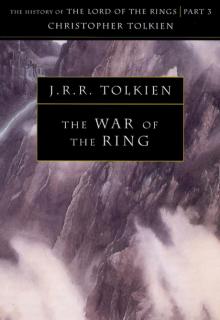 The History of Middle Earth: Volume 8 - The War of the Ring
The History of Middle Earth: Volume 8 - The War of the Ring Mr. Bliss
Mr. Bliss Unfinished Tales
Unfinished Tales The Adventures of Tom Bombadil
The Adventures of Tom Bombadil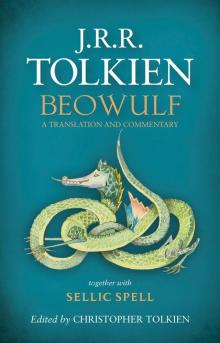 Beowulf: A Translation and Commentary, together with Sellic Spell
Beowulf: A Translation and Commentary, together with Sellic Spell The Silmarillion
The Silmarillion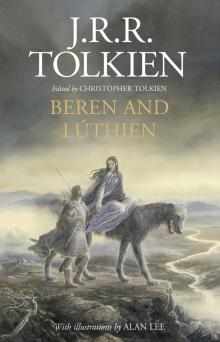 Beren and Lúthien
Beren and Lúthien